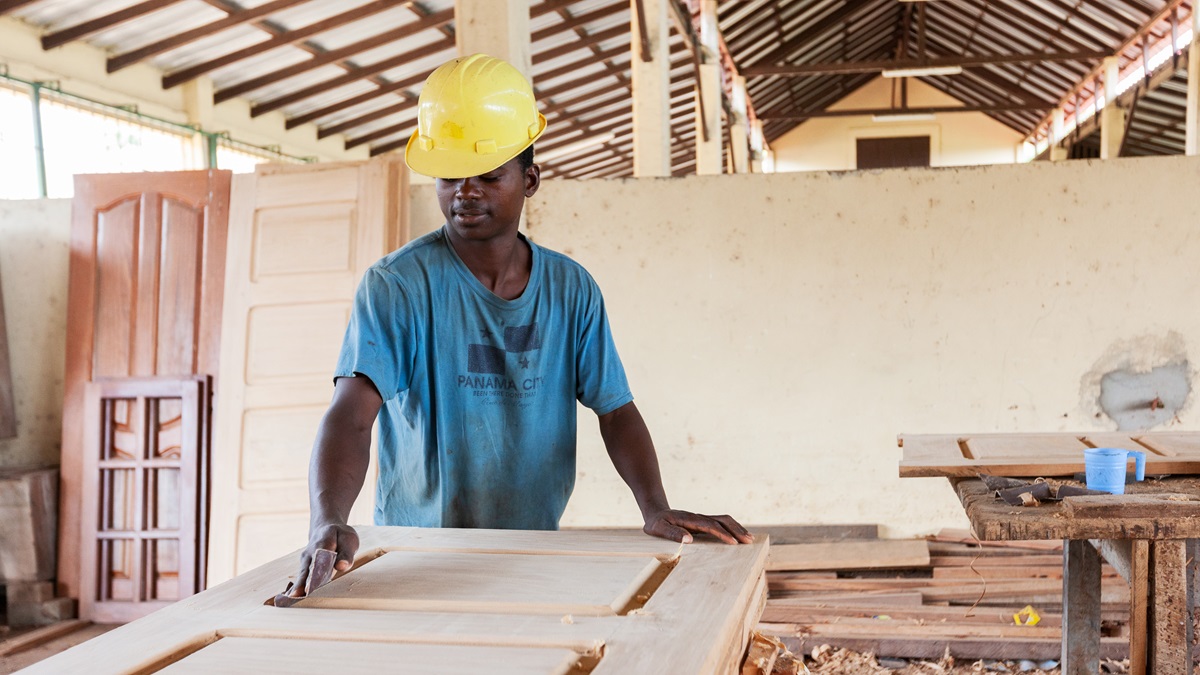UNCTAD fosters resilient entrepreneurship for economic diversity in the Southern African nation.
© Shutterstock/Andre Silva Pinto | Carpenter making a door in Cabinda, Angola.
Angola is developing a national strategy to foster entrepreneurship.
The strategy will help diversify the country’s oil-dependent economy and tackle unemployment, estimated at 30.2% among people aged 15 and above.
Entrepreneurship can drive sustainable development and promote inclusive growth.
Developing a national entrepreneurship strategy in Angola is high on the political agenda and aligned with the country’s 2050 strategy, focused on economic diversification and growth, among other priorities.
It’s also part of the government’s 2023-2027 National Development Plan, which includes strengthening the business environment, fostering entrepreneurship and positioning the private sector as the main driver of economic development.
To lay the building blocks of the national entrepreneurship strategy, UNCTAD has supported the country’s National Institute of Support to Micro-, Small and Medium-Sized Enterprises (INAPEM) to design a national entrepreneurship review, with an action plan.
“We want to diversify the economy and make it more competitive on the international market,” says Amadeu de Jesus Leitão Nunes, Angola’s Secretary of State for Commerce.
“For this to happen, we are developing a stronger framework that will encourage entrepreneurship, drive innovation and facilitate access to funding,” he added. “UNCTAD’s support towards a national entrepreneurship strategy is an important step in the right direction.”
Entrepreneurship blueprint
The strategy will serve as a blueprint for fostering and promoting entrepreneurship in Angola.
It will set out a comprehensive national agenda to reinforce and support the entrepreneurial spirit, especially among the youth, and provide a framework to promote coordination among key actors.
UNCTAD and INAPEM conducted a mapping exercise and multistakeholder consultation rounds, resulting in a set of action points. The work was based on UNCTAD’s Entrepreneurship Policy Framework methodology.
Priority actions include standardizing and streamlining regulations and bureaucratic procedures, reinforcing online one-stop-shops and providing comprehensive information on financing opportunities.
Equally important is the need to invest in human capacity and cultivate an entrepreneurial mindset through targeted skill development initiatives and the promotion of business opportunities.
Towards sustainable businesses
“Designing and implementing a national entrepreneurship strategy not only focuses on the number of businesses created but also on their ability to grow and become sustainable,” says Arlette Verploegh, who heads UNCTAD’s work on entrepreneurship development. “This requires multistakeholder involvement and long-term commitment.”
She underscores the transformative potential of entrepreneurship to drive sustainable development at the local level and herald socioeconomic growth, innovation, democratization of technologies and greening of an economy.
A tailored strategy
Unlocking Angola's full entrepreneurial potential demands a tailored strategy attuned to the nation's unique challenges and opportunities.
A least developed country in the process of graduating from this category, Angola had the eighth-largest economy in Africa in 2022, with a GDP of $107 billion, according to the World Bank.
But it’s highly dependent on oil and gas sectors, with informal (unregistered) businesses accounting for about 80% of small businesses or one third of Angola’s GDP.
The country also suffers high unemployment rates, especially in urban areas and among the youth, according to its National Statistics Institute.
In 2022, unemployment was estimated at 30.2% among people aged 15 and above. Unemployment disparities are greater among women, at 41.6% in urban areas against 14.1% in rural ones.
The national entrepreneurship strategy will help tackle these challenges and buttress Angola's quest for economic resilience and inclusive growth.
UNCTAD supported the design of the national entrepreneurship review under the TrainforTrade II EU-UNCTAD joint Programme for Angola, reinforced by Empretec, the organization’s flagship capacity-building programme for entrepreneurial skill development and financed by the European Union.

